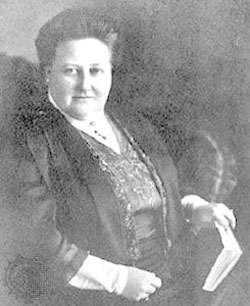Издателство |
| :. Издателство
LiterNet |
Медии |
| :. Електронно списание LiterNet |
| :. Електронно списание БЕЛ |
| :. Културни
новини |
Каталози |
| :. По
дати : Март |
| :. Електронни книги |
| :. Раздели / Рубрики |
| :. Автори |
| :. Критика за авторите |
Книжарници |
| :. Книжен
пазар |
| :. Книгосвят: сравни цени |
Ресурси |
| :. Каталог за култура |
| :. Артзона |
| :. Писмена реч |
За
нас |
| :. Всичко за LiterNet |
AMY LOWELL
(1874-1925)
 Amy Lowell, American Imagist poet, was a woman of great accomplishment. She was born in Brookline, Massachusetts, to a prominent family of high-achievers. Her environment was literary and sophisticated, and when she left private school at 17 to care for her elderly parents, she embarked on a program of self-education.
Amy Lowell, American Imagist poet, was a woman of great accomplishment. She was born in Brookline, Massachusetts, to a prominent family of high-achievers. Her environment was literary and sophisticated, and when she left private school at 17 to care for her elderly parents, she embarked on a program of self-education.
Her poetic career began in 1902 when she saw Eleonora Duse, a famous actress, perform on stage. Overcome with Eleonora's beauty and talent, she wrote her first poem addressed to the actress. They met only a couple times and never developed a relationship, but Eleonora inspired many poems from Amy and triggered her career.
Ada Russell, another actress, became the love of Amy's life. She met Ada in 1909 and they remained together until Amy's death in 1925. Amy wrote many, many poems about Ada. In the beginning, as with her previous poems about women, she wrote in such a way that only those who knew the inspiration for a poem would recognize its lesbian content. But as time went on, she censored her work less and less. By the time she wrote "Pictures of the Floating World", her poems about Ada were much more blatantly erotic. The series "Planes of Personality: Two Speak Together" chronicles their relationship, including the intensely erotic poem "A Decade" that celebrates their tenth anniversary.
Amy's dedication to the art of poetry was consuming. She purchased her parent's estate upon her death and established it as a center of poetry, as well as a place to breed her beloved English sheepdogs. She promoted American poetry, acting as a patron to a number of poets. Amy also wrote many essays, translated the works of others, and wrote literary biographies. Her two-volume biography of Keats was well-received in the United States, though it was rejected in England as presumptous.
She is best known for bringing the Imagist movement to America. Her own work, full of lush imagery but slim on excess verbage, was similar to that of H.D. (Hilda Doolittle), an emerging American Imagist poet in England. When Amy saw the similarity, she traveled to England to research the movement and ended up bringing back volumes of poetry to introduce Imagist work to the United States. Ezra Pound, the "head" of the movement, was most offended by Amy's involvement. He threatened to sue her and finally removed himself from the movement entirely. She argued that this was good; he would ruin it anyway. Pound took to calling the movement "Amygisme," and engaged in plenty of scathing attacks against her.
Beyond the slurs hurled by Pound, Amy was criticized for many more things that did not actually reflect her skill as a poet. Critics were offended by her lesbianism, by the way she wore men's shirts and smoked cigars, and even by her obesity. They argued that she must not have experienced true passion, reflecting a common prejudice that women who are overweight cannot possibly be sexual beings. In the face of these barbs, her literary career suffered, and she did not achieve the status as a poet she so richly deserved.
Her admirers defended her, however, even after her death. One of the best rebuttals was written by Heywood Broun, in his obituary tribute to Amy. He wrote: "She was upon the surface of things a Lowell, a New Englander and a spinster. But inside everything was molten like the core of the earth... Given one more gram of emotion, Amy Lowell would have burst into flame and been consumed to cinders."
Amy Lowell's book, "What's O'Clock", was awarded the Pulitzer Prize in 1926, a year after her death.
=============================
© E-publisher LiterNet, 05.07.2009
The Sun Is but a Morning Star. Anthology of American Literature. Edited by
Albena Bakratcheva. Varna: LiterNet, 2008-2010
